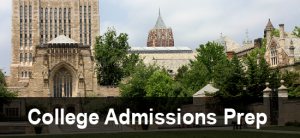You’re getting a sneak peek into what Dartmouth is looking to learn from your alumni interviews.
What I’m sharing will help you prepare for alumni interviews with any college, so read on even if you’re not applying to Dartmouth.
Take advantage of any opportunity you have to participate in alumni interviews, especially if they are evaluative. Dartmouth and Yale are just two of the many colleges which conduct alumni interviews that are both informative and evaluative.
Informative interviews provide you with the ability to learn about the school from a member of its alumni network. Evaluative alumni interviews offer the admissions committee additional perspectives on you, which are taken into consideration in the decision-making process.
Alumni interviews can be stressful, especially when you don’t understand how you are going to be evaluated.
Imagine knowing that you have an exam but not knowing what it’s about. Imagine having to write an essay but not knowing what mattered to your teacher in terms of content, scope, and style.
It wouldn’t be pleasant, and you probably wouldn’t do as well as you could on them.
I’m giving you a behind-the-scenes account of the categories that Dartmouth alumni interviewers are asked to “keep in mind while conducting” their interviews and then describe in their written reports.
Keep in mind that most colleges are curious about the same things.
WHAT DARTMOUTH WANTS TO LEARN ABOUT FROM YOUR ALUMNI INTERVIEW
CATEGORY #1: Dartmouth is looking for more insight into your “intellectual engagement and curiosity,” especially “academic experiences that have” shaped your way of thinking, your “love of learning, creativity, depth of thought, breadth of awareness, and articulateness in idea expression.” The admissions team also wants to learn about how you’ve challenged yourself intellectually, if you “demonstrate even greater potential for growth,” any “distinguishing features” of your “academic accomplishments,” and what you have “learned through” your “academic endeavors.”
The admissions committee doesn’t just want declarations. They want specific examples from the interview that support the evaluations.
CATEGORY #2: Admissions officers are also interested in your “commitment and personal motivation in activities.” Dartmouth “seeks candidates who have demonstrated talent, tenacity, commitment, leadership, and the potential to make a positive, significant contribution to the College community.” Interviewers are asked to “comment on. . .one or two” of your “most significant extracurricular activities” in order to help the admissions team gauge the extent to which you fit this profile.
CATEGORY #3: Like all colleges, Dartmouth is eager to learn more about your character, especially qualities like “initiative, responsibility, tolerance, resilience, integrity, independence, and maturity.” Interviewers are once again asked to include specific examples that shed light on these qualities and distinguish you from others.
HOW TO PREPARE FOR YOUR DARTMOUTH
AND OTHER ALUMNI INTERVIEWS
Now let’s consider how you can apply what you’ve just learned about Dartmouth’s categories in order to simplify your preparation and feel more empowered.
TIP #1: Come up with short but vivid anecdotes that illustrate your “intellectual engagement and curiosity,” “commitment and personal motivation in activities,” and character. Don’t use any of these phrases. You don’t want to be telling. You want to be showing.
TIP #2: Don’t try to cover everything. Zoom in. For instance, you might want to concentrate on a particular intellectual project and/or interest. You might even want to zero in on a specific aspect of your project or area of interest. How did you come up with the idea? What fascinates you about it? What was the most interesting or challenging part of your project? What are your next steps?
TIP #3: Prepare a variety of anecdotes for each of the categories and practice saying them out loud. This strategy helps you get into the rhythm of telling anecdotes.
TIP #4: Don’t memorize your anecdotes. That’s my advice for most students, though there can be exceptions. You don’t want to come across as though you’re reading from a transcript.
TIP #5: Keep your mind agile and be prepared to adapt your anecdotes to the questions you’re actually asked. This is one of the reasons why you don’t want to memorize your anecdotes. When you memorize them, you’re more likely to get locked into them and have a hard time rolling with the questions.
TIP #6: Experiment. Adapt your anecdotes to respond to other questions. This strategy will give you experience thinking, adapting, and responding on the fly, which is what you’re going to need to do during your interviews. Trying to prepare for all questions ahead of time is ineffective and disempowering.
TIP #7: Prepare to have a good conversation. Go into the experience thinking that you’re having a conversation with someone who is passionate about his or her alma mater and very interested in the next generation of students. As Dartmouth reminds its alumni interviews, they should ” try to set a conversational tone during the interview. . . .The interview should last 30-45 minutes, including time for the applicant to ask his or her questions at the end.”
WANT MORE STRATEGIES
FOR ALUMNI INTERVIEWS?
Check out “The Worst Alumni Interview Question and How to Answer It,” “Preparing for Your Alumni Interview,” and “Sneak Peek at Yale Alumni Interviewer Reports.”
WAYS TO WORK WITH DR. BERNSTEIN
Click here to learn how to schedule a private consultation.
Click here to learn more about Dr. Bernstein’s ongoing private college preparation and college admissions support.
Click here to learn about the online Get Yourself Into College® program.
Blog post image used: ©Kotin/bigstock.com



